Ongoing Activities
A5

Agrifood 5 Alliance
Five top-ranked academic institutions of agricultural, food system and environmental sciences joined forces to form the Agrifood 5 (A5) Alliance in an effort to address one of the greatest challenges of our society: to sustainably feed the world’s expanding global population. It requires transformations of the world’s agricultural and food systems based on ideas and innovations that cut across geographical, cultural and disciplinary borders.
SDG2
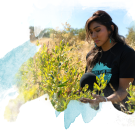
Sustainable Development Goal 2
The 2030 Agenda for Sustainable Development, adopted by all United Nations Member States in 2015, provides a shared blueprint for peace and prosperity for people and the planet, now and into the future. At its heart are the 17 Sustainable Development Goals (SDGs), which are an urgent call for action by all countries - developed and developing - in a global partnership. They recognize that ending poverty and other deprivations must go hand-in-hand with strategies that improve health and education, reduce inequality, and spur economic growth – all while tackling climate change and working to preserve our oceans and forests.
Past Events

SDG2 Zero Hunger Consortium
November 2022 - May 2023
In November 2022, the SDG2-Zero Hunger Consortium launched the inaugural SDG2-Zero Hunger International Student Challenge. This challenge provided a unique opportunity for undergraduate and graduate students to collaborate across universities, countries and disciplines and generate innovative ideas to advance SDG2. More than 200 students applied to participate from around the world.
In May 2023, 11 teams successfully completed the challenge; each team produced a three-minute video explaining an innovative idea for addressing hunger, malnutrition or food insecurity. The winning teams included diverse students studying at different geographical locations, including Brazil, Spain, UK, Costa Rica, Mexico, Canada, and the United States.
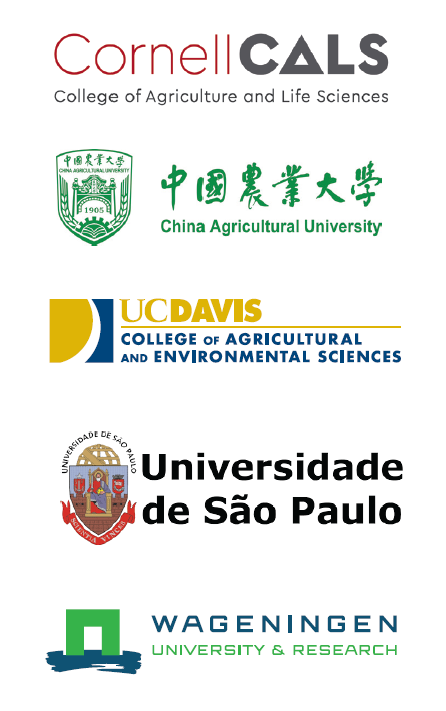
A5 Consortium
October 3-4, 2023
Five top-ranked academic institutions of agricultural, food system and environmental sciences joined forces to form the Agrifood 5 (A5) Alliance in an effort to address one of the greatest challenges of our society: to sustainably feed the world’s expanding global population. It requires transformations of the world’s agricultural and food systems based on ideas and innovations that cut across geographical, cultural and disciplinary borders.
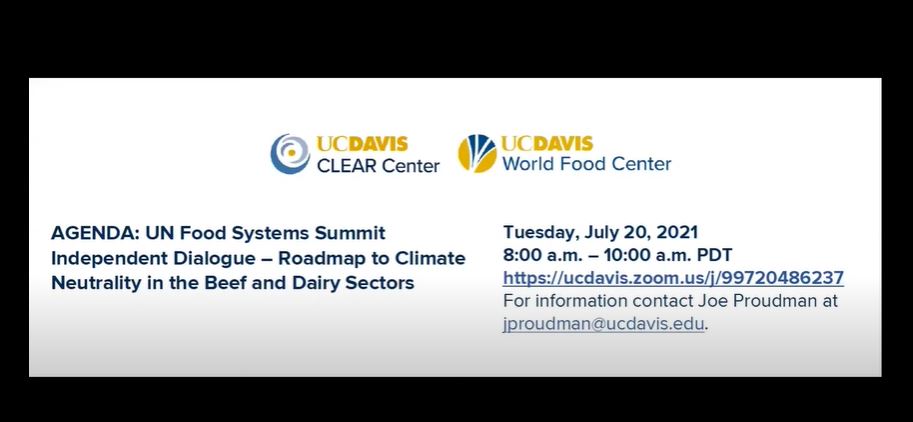
United Nations Food System Summit Independent Dialogue: Roadmap to Climate Neutrality in the Beef and Dairy Sectors
July 20, 2021
The United Nations Food System Summit Independent Dialogue, Roadmap to Climate Neutrality in the Beef and Dairy Sectors, convened experts from government, academia, industry, and NGOs to tackle the challenges of animal-sourced food production while reducing greenhouse gas emissions associated with it. The event was convened by Dr. Frank Mitloehner, director of the CLEAR Center, and Dr. Ermias Kebreab, director of the World Food Center.
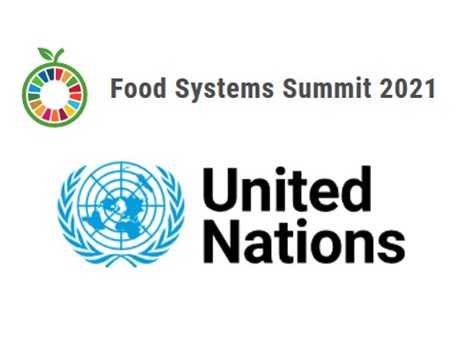
Food Systems Summit 2021 Dialogues: Expert-to-Expert Engagement on U.S. Innovations for Food Systems Change
June 25 - July 15, 2021
Following the adoption of the Sustainable Development Goals (SDGs) in 2015, the topic of “food systems” have gained prominence to articulate approaches towards achieving agriculture, food, and poverty/hunger-related targets of the SDGs. In 2021, the United Nations (UN) is organizing a series of meetings and events on food systems that will culminate in the UN Food Systems Summit (FSS) scheduled to take place in September 2021, in New York.
At the request of USDA Foreign Agricultural Service, the WFC and UC Office of the President convened eight expert-to-expert virtual meetings/workshops focused on the five Action Tracks of SDG2, Zero Hunger. Specific focus was on technical information sharing and coalition building with experts and food system stakeholders in key developing countries. Although the Independent Dialogues were invitation only, recordings are available to the public.
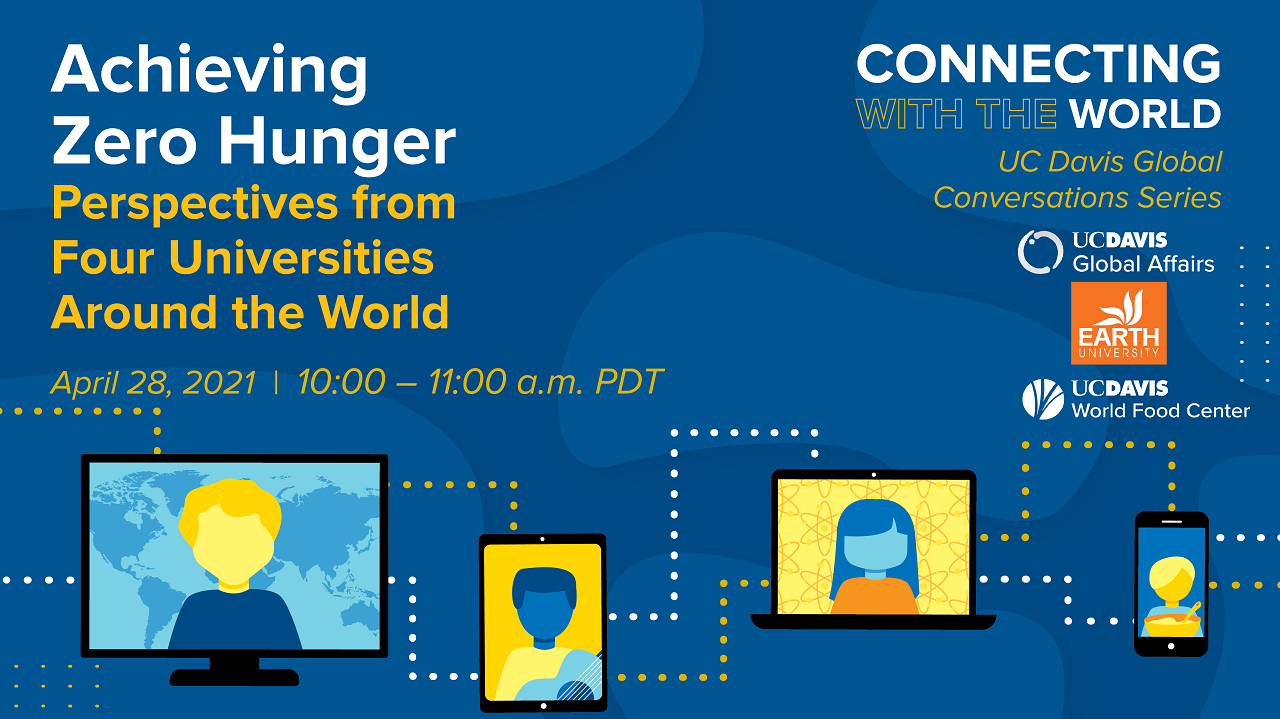
UC Davis Global Conversation Series Achieving Zero Hunger: Perspectives from Four Universities Around the World
April 28, 2021, 10am PST
After decades of progress in reducing the number of people affected by hunger and malnutrition, the prevalence of global hunger began to increase again in 2015. The emergence of the COVID-19 pandemic has worsened the situation, and if recent trends continue, the United Nations estimates that the number of people affected by hunger will surpass 840 million by 2030.
This online panel discussion was jointly hosted by UC Davis Global Affairs, the World Food Center and Earth University on April 28, 2021 and featured experts from UC Davis, Earth University, Stellenbosch University and Newcastle University discussing how to achieve Zero Hunger. This discussion was part of the University Global Coalition (UGC) Decade of Action Initiative, which brings together UC Davis and other like-minded universities across the world to work in partnership to address UN Sustainable Development Goal #2: Zero Hunger.
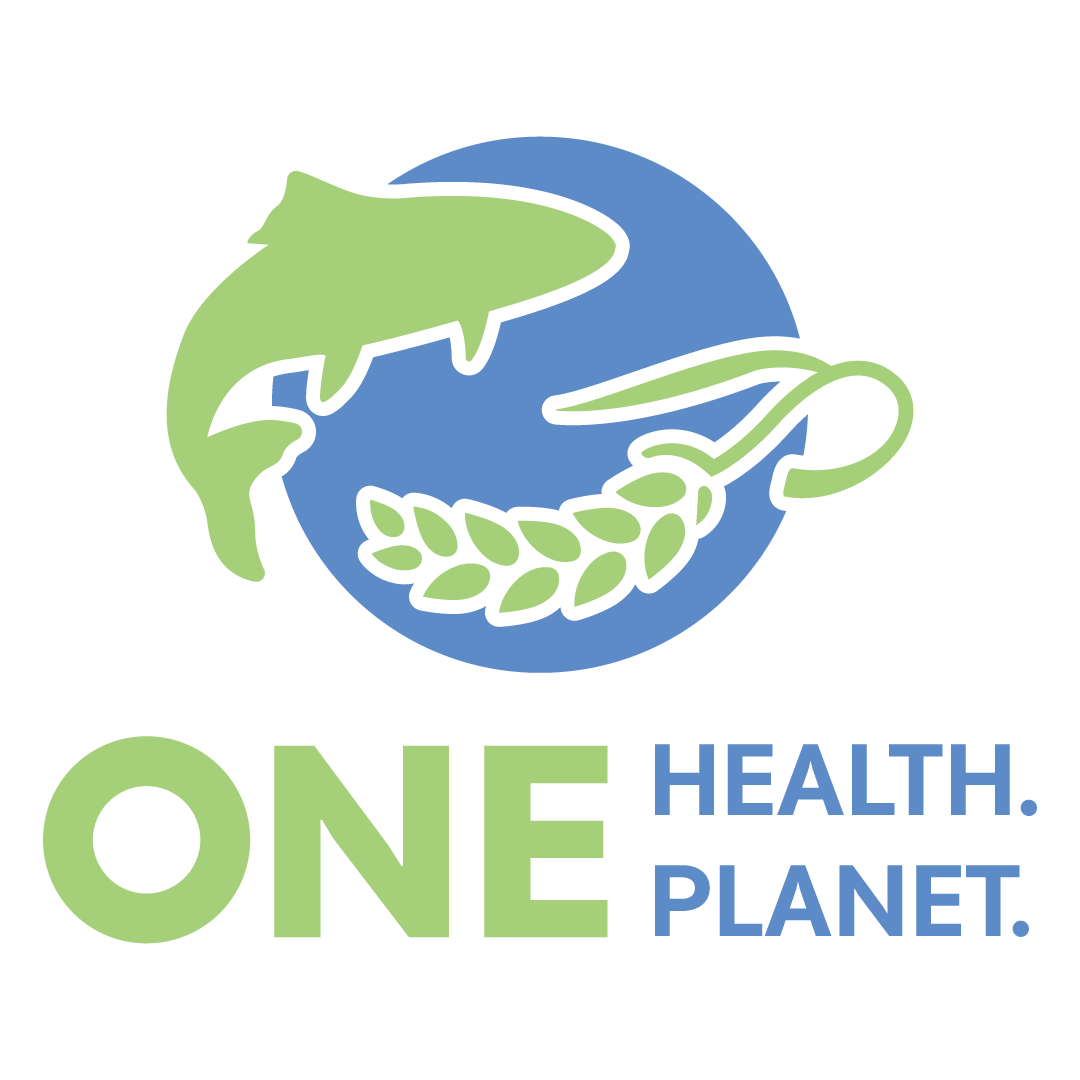
Universities Fighting World Hunger 2021 Summit
March 25-26, 2021
The UC Davis World Food Center, UCOP and Auburn University's Hunger Solutions Institute co-hosted the 2021 Universities Fighting World Hunger (UFWH) Virtual Summit.
This year's theme One Health. One Planet. was conceived even before the pandemic, but the conversation could not come at a more crucial moment. The world continues to teeter on the precipice of a climate crisis, the risks of food insecurity has increased exponentially, and we will be marking a solemn anniversary from when the reality of the pandemic began, closing us off from each other and shutting down our economies in March 2020.
The year 2021 will be about resilience and resurgence, both planetary and human, and our hope is the conference will provide attendees with tools, information, and knowledge to collectively forge ahead as solutionists. Our presenters and panelists spoke to a broad array of topics covering human health, the planet, and their inherent connectivity.
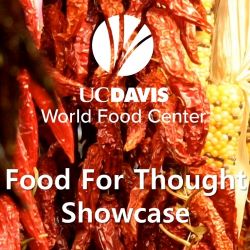
Food For Thought Showcase
November 10, 2020
The World Food Center hosted our third Food For Thought Showcase as a virtual event. Attendees discovered centers and institutes at UC Davis shaping the future of food, and networked with our local and regional community of faculty, staff, students, industry partners, and more.
The event began with a series of 13 elevator pitches from UC Davis programs, institutes, and centers. Attendees learned of their innovative work in several aspects of the food system. After the pitch session, attendees could visit breakout rooms with their chosen centers, learned more and mingled with others.
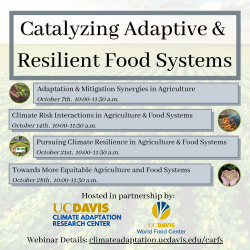
Catalyzing Adaptive and Resilient Food Systems Workshops
October 2020
Climate change and associated extreme disaster events threaten agricultural productivity, food stability, and rural community resilience around the world. This webinar series brought together diverse perspectives -- from climate scientists and social scientists to crop biologists and ecologists -- to address the multi-dimensional challenges and opportunities associated with developing climate adaptive and resilient food systems in California, the US, and beyond.
The webinar series took place over four weeks in October 2020, with coordinated sessions on climate adaptation/mitigation synergies, managing risk interactions, operational responses to climate change, and strategies to enable justice in agricultural and food systems. Each session engaged science and policy experts from the field, and included interactive online participation from local and state government, agricultural firms and commodity boards, communities, and researchers. The goal of the webinar series is to generate productive discussions that highlight emerging science on climate change impacts experienced by various food systems, agricultural sectors, and communities. Insights from the webinars will be used a design a larger conference event scheduled for Spring 2021.
These workshops were hosted with support from the UC Davis World Food Center and the UC Davis Air Quality Research Center.
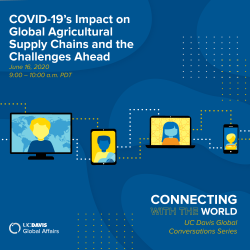
COVID-19’s Impact on Global Agricultural Supply Chains and the Challenges Ahead
June 16, 2020
The COVID-19 pandemic disrupted agricultural supply chains within the United States and worldwide. A panel of experts from academia, industry and the non-profit sector discussed how the pandemic has disrupted global supply chains in the near-term. Looking ahead, they offered an assessment of COVID 19’s long-run impact on global agricultural trade and how we can prepare for similar crises in the future. This event was in collaboration with the International School of Agri Management - ISAM, and is also part of the Campus Global Theme: Food for Thought: Feeding Ourselves, Feeding the Planet.
Panelists included Flavio Alzueta, chief marketing officer, G.A.P. GLOBAL and professor at the the International School of Agri Management;Shakira Phiri, investment promotion officer at the Ministry of Industry, Trade and Tourism in Malawi, and 2018-19 Mandela Washington Fellow at UC Davis; Gloria E. Polanco, General Manager of FRUTESA (Frutas Tropicales de Guatemala, S.A.); and Daniel Sumner, Frank H. Buck, Jr. Distinguished Professor, Department of Agricultural and Resource Economics, Director of the University of California Agricultural Issues Center. Moderated by Ermias Kebreab, director of the UC Davis World Food Center, associate dean of the College of Agricultural and Environmental Sciences Global Engagement, and professor and Sesnon Endowed Chair in animal science, UC Davis.

Dialogues: Science and the Social License
November 4, 2019 | UC Davis Conference Center
The world's population is expanding, food demands are rising, and climate risks are becoming more disruptive. Scientific advancements can be utilized to solve these existential threats, but misinformation and discouraging public opinion prevent these solutions from being brought to light. How do we close the growing gap between scientific innovation and public acceptance? Using climate change policy and genetic engineering as case studies, Dialogues: Science and the Social License investigated why public opinion diverges from scientific discovery and discussed what we can do to bridge the innovation gap. This conference featured perspectives and panel dialogues from scientists, communicators, psychologists, and subject-matter experts, and brought together diverse stakeholders to discuss the relationship between science, culture, and policy.
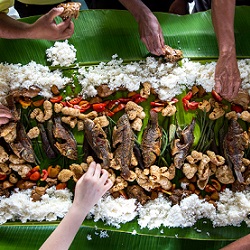
World Food Day Festival
October 16, 2019 | UC Davis International Center
The World Food Center celebrated World Food Day 2019. This festival featured a showcase of student and faculty groups focused on international food from a cultural and academic perspective. Visitors of the festival enjoyed food, drinks, music, and more at the International Center Multipurpose Room.

Developing an Agrifoods System Blueprint for California
September 13, 2019 | Sacramento Natural Foods Cooperative, Sacramento, CA
Value-added agriculture and food products remain very popular and are increasingly used in larger economic development policies for enhancing community development outcomes. However, the multi-stakeholder chains providing these goods and services are under considerable pressure to survive, all too often by the business partnerships that empowered platforms for local production and distribution. What if these stakeholders controlled their own value chain? This one-day workshop convened and strategized around key players to advance a multi-stakeholder agrifoods value chain and was supported by the UC Davis World Food Center, the Sacramento Natural Foods Co-op, and Valley Vision.
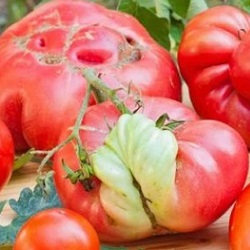
Aligning the Food System for Food Safety in Food Waste Solutions
May 15-16, 2019 | UC Davis Walter A. Buehler Alumni Center
It is estimated that between 25-40% of all food is never eaten. These losses represent significant economic and environmental costs, but opportunities exist to improve the efficiency of our food systems. Sponsored via the World Food Center's Aligning the Food System platform, this workshop considered proposed solutions to recover and recycle food loss and waste (FLW) in the context of balancing food safety concerns. By engaging industry, academic, policy, regulatory, extension, and NGO partners, the workshop was the first of its kind to identify best practices and future directions for food safety in food waste solutions.
Aligning the Food System for Improved Nutrition in Animal Source Foods
May 14-15, 2019 | UC Davis Conference Center
This two-day conference focused on the importance of animal source foods for human nutrition and health, particularly among pregnant women and young children; gaps and barriers to consumption among low-income populations; sustainability and environmental considerations of animal agriculture; and innovative strategies and supporting public policies to address the challenges. This conference was collaboratively hosted by the Department of Animal Science, the Program in International and Community Nutrition, and the World Food Center at UC Davis.
